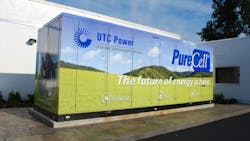Today’s electrical grid relies heavily on modern communications systems such as voice, data and video to monitor and maintain utilities’ networks. When severe weather strikes and service is interrupted, these communications systems are of utmost importance.
Utilities rely on the communications systems running parallel to their grid to identify problems, coordinate truck rollouts and restore power. In cases where power outages can last several days, legacy back-up power systems such as diesel generators or battery banks often will run out of fuel or power.
The deployment of fuel cells, however, offers electric utilities or supporting telecoms back-hauling a utility’s communications with a back-up power system that offers longer run-time and increased reliability. In turn, this results in improved uptime of the critical communications networks needed to restore power to communities.
Facing Challenges with Deployment
The Telecommunications Industry Association (TIA) has created an Exploratory Focus Group on Fuel Cell Standards for Wireless and Other Critical ICT Infrastructure to provide a forum for fuel cell companies, mobile network operators, cell site leasing companies, engineering firms, government entities and others to develop a document that can provide the information and communications technology (ICT) industry with a guide to the technical considerations and benefits of stationary fuel cell deployment in support of wireless networks and other critical ICT infrastructure. The focus group has outlined several goals for the document:
- Identify use cases and best practices in support of fuel cell deployment
- Identify both existing codes and standards applicable to fuel cell deployment in support of wireless and other critical ICT infrastructure as well as any possible gaps within existing codes and standards that the industry should address.
- Provide premise owners and federal, state and local governments information on the benefits and relative safety of fuel cell technology
- Identify various fuel cell technologies and the pros and cons of each per cell site application
- Suggest actions the industry, standards development organizations, and federal, state and local governments should take to further the industry’s adoption of fuel cell technologies.
TIA developed this focus group because of concerns from fuel cell manufacturers and the ICT industry over inconsistent interpretations of existing codes and standards, and gaps within available standards. Currently, the ICT industry doesn’t have a clear guide to the deployment of fuel cells and must rely on codes and standards applicable to a wide variety of fuel cell applications. This problem is particularly evident when implementers are looking to deploy fuel cells to support rooftop antenna systems.
Further challenges to fuel cell deployment have been caused by a limited understanding of fuel cell technology. Often, property managers dismiss the idea of a fuel cell once they hear the word hydrogen and they immediately think of Hindenburg. Unfounded safety concerns are an unfortunate fallacy that hinders the deployment of fuel cells. Property managers and other authorities having jurisdiction, such as fire marshals and building inspectors, must be informed.
Another challenge facing implementers of stationary fuel cell technology is related to the cost-efficient resupply of hydrogen. This challenge can manifest itself in multiple ways. For example, one must consider the transport of hydrogen to remote cell site stations versus the resupply of hydrogen to a rooftop cell site. Each operating environment presents different logistical challenges, and the focus group intends to address the need for new thinking with regards to the supply of hydrogen.
Targeting Future Outcomes
The focus group will start as a nonformulating focus group, meaning it will not be developing standards under TIA’s technology and standards department. Participation is open to any person or company that has a material interest within the respective jurisdiction of the focus group. TIA membership is not a prerequisite for participation.
Through the creation of the focus group, TIA hopes to develop a document that serves as a guide to the technical considerations and benefits of fuel cell deployment. Also, it will identify any gaps within existing codes and standards, and pinpoint any potential future work items. Finally, it will include information on the possible creation of a standards formulating group to address future work items.
By working with other associations and companies, TIA is aiming to identify the challenges with fuel cell deployment, provide suggestions to clarify standards and help address the need for a sustainable, reliable and cost-effective backup power source for critical communications systems.
Jeff Hannah ([email protected]) is standards and technology development manager for the Telecommunications Industry Association.
